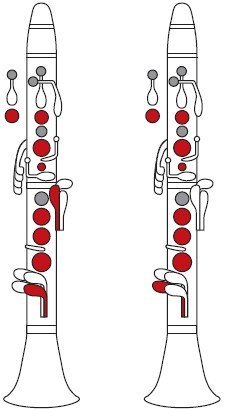The D# Mixolydian Scale: A Unique Flavor in Clarinet Music
The D# Mixolydian scale occupies a special place in clarinet music. Musicians and music lovers might not be aware of its fascinating history and the lively sound it produces, particularly when performed on high-quality instruments like those made by Martin Freres. This intriguing variation of the major scale follows a specific pattern of whole steps and half steps, making it perfect for improvisation and creating captivating melodies.

Clarinet Fingering Charts are always FREE at MartinFreres.net!
Historical Roots of the D# Mixolydian Scale
The D# Mixolydian scale has its origins in various musical traditions and genres. It's deeply rooted in folk music, where the clarinet played a key role in expressing local and national identity. From lively Eastern European dances to heartfelt jazz melodies, this scale adds richness and depth to musical expressions.
Expressive Possibilities for Clarinetists
When clarinetists use the D# Mixolydian scale, they open up a world of expressive options. The scale's flat seventh note creates a unique tonal experience, different from the traditional major scale. This allows for unexpected twists and character in musical phrases. Players can explore new melodic ideas, improvise freely, and express a wide range of emotions in their performances.
| Scale Degree | Note | Interval |
|---|---|---|
| 1 | D# | Root |
| 2 | F | Major 2nd |
| 3 | G | Major 3rd |
| 4 | G# | Perfect 4th |
| 5 | A# | Perfect 5th |
| 6 | C | Major 6th |
| 7 | D | Minor 7th |
Jazz and Improvisation: The D# Mixolydian Scale's Playground
Jazz musicians have particularly taken to the D# Mixolydian scale because it's great for improvisation. Think about the famous jazz clarinetists – they often used the unique colors of this scale to make their solos stand out. Many well-known jazz tunes use the Mixolydian sound, creating music that's both complex and easy to enjoy. Jazz clarinetists love the D# Mixolydian scale because it lets them be creative within familiar structures.
Versatility Across Musical Genres
The D# Mixolydian scale's importance in music history comes from how versatile it is, whether in classical pieces or modern styles. It connects the past with the present, linking clarinetists to music traditions that came before them. Every note played in this scale carries a bit of history, echoing past sounds and opening doors for new musical ideas.
Martin Freres Clarinets: Perfect for the D# Mixolydian Scale
Martin Freres clarinets work wonderfully with the D# Mixolydian scale thanks to their excellent craftsmanship and sound quality. Players often notice that these instruments' warmth and richness make exploring this unique scale even better, allowing for expressive phrasing and dynamic performances. As musicians dig into the details of this scale, they discover both the technical aspects and the emotional depth that makes music so powerful.
A Transformative Learning Experience
For students and new clarinetists, learning about the D# Mixolydian scale can be eye-opening. Working with this scale broadens their musical vocabulary and gives them tools to create rich, engaging performances. Understanding how this scale has been used across different types of music and time periods helps young musicians develop their own musical identity, connected to the legacy of earlier players.
Conclusion: The Magic of the D# Mixolydian Scale
The D# Mixolydian scale is more than just a set of notes; it's a journey through the rich history of clarinet music. It encourages players to explore, express themselves, and see connections between different musical styles and traditions, deepening their understanding of the instrument. Try out this scale on a Martin Freres clarinet and let its historical importance guide you through the changing world of music.
Table of Contents
- The D# Mixolydian Scale: A Unique Flavor in Clarinet Music
- Historical Roots of the D# Mixolydian Scale
- Expressive Possibilities for Clarinetists
- Jazz and Improvisation: The D# Mixolydian Scale's Playground
- Versatility Across Musical Genres
- Martin Freres Clarinets: Perfect for the D# Mixolydian Scale
- A Transformative Learning Experience
- Conclusion: The Magic of the D# Mixolydian Scale








